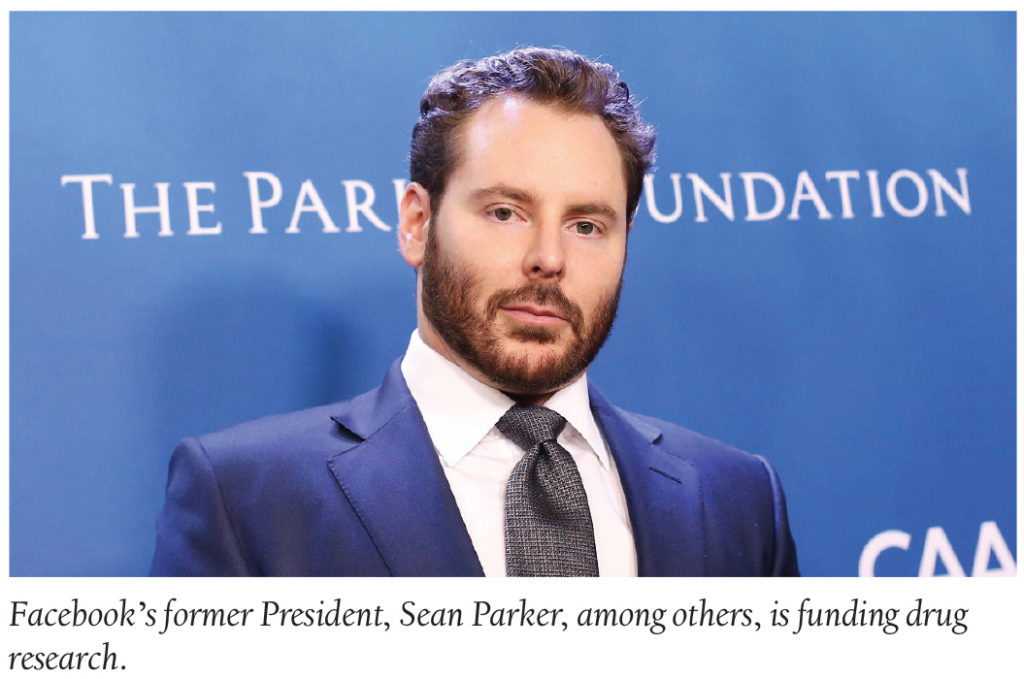Wealthy Philanthropists to Drastically Change Drug Research
 Facebook founder Mark Zuckerberg and his wife Priscilla Chan want to “cure, prevent, or manage all disease” by the end of the century—and they are not alone. Philanthropists such as Facebook’s former president Sean Parker, Citigroup former CEO Sandy Weill, and Nike co-founder Phil Knight, are all funding drug research with new conditions. Sean Parker demands that scientists pledge to cooperate rather than compete and focus on making drugs rather than writing papers. Marketable discoveries will be group affairs, no matter who leads the research, and profits will be divided evenly among institutions, including his own Parker Institute for Cancer Immunotherapy. And while scientists who heard his plan were skeptical, more than 300 researchers are onboard and clinical trials have begun.
Facebook founder Mark Zuckerberg and his wife Priscilla Chan want to “cure, prevent, or manage all disease” by the end of the century—and they are not alone. Philanthropists such as Facebook’s former president Sean Parker, Citigroup former CEO Sandy Weill, and Nike co-founder Phil Knight, are all funding drug research with new conditions. Sean Parker demands that scientists pledge to cooperate rather than compete and focus on making drugs rather than writing papers. Marketable discoveries will be group affairs, no matter who leads the research, and profits will be divided evenly among institutions, including his own Parker Institute for Cancer Immunotherapy. And while scientists who heard his plan were skeptical, more than 300 researchers are onboard and clinical trials have begun.
Christiana Bardon, MD, Managing Director of an oncology-focused fund at the investment firm MPM Capital, says that this new platform forces scientists to get more research done. She notes, “That’s much more pragmatic and aggressive and impactful.”
Regeneron CEO Speaks About Rising Drug Prices
Leonard Schleifer, CEO of Regeneron, said the pharma industry has gained an unsavory reputation due to “double-digit price increases every year in lieu of innovation,” at the Forbes Healthcare Summit in New York. Schleifer reminded the audience that his company has never raised drug prices—igniting a heated debate. Pfizer CEO, Ian Read, headed the opposition who said, “The total cost of drugs has not changed as a percentage of healthcare spend in two decades.”
Schleifer’s confidence in his company’s R&D production stems from the anticipated launch of their second key drug, Praluent. However, Pfizer operates on a very different scale than Regeneron, leading Read to believe other factors besides innovation could prevent the rise of drug prices. A more efficient FDA would also help matters, said Read, who has claimed that about 30-times more data is now required to support an approval. Schleifer appreciates this equalizing effect, saying that innovation is exactly what strict FDA codes encourage.
Novartis Drug Achieves 82% Complete Leukaemia Remission
At a recent American Society of Hematology meeting, Novartis announced that their experimental drug CTL019 achieved complete remission or complete remission with incomplete blood count recovery at three months post-treatment in 82% of patients with relapsed/refractory B-cell acute lymphoblastic leukaemia.
The results come from a Phase II study in which 41 patients in the ELIANA trial experienced complete remission. Novartis notes that those with more leukaemia in their body experience more illness and other side effects on their way to remission. It plans to seek approval from the U.S. FDA in early 2017.
Myeloma Genome Project Established
Celgene, Dana-Farber Cancer Institute, and University of Arkansas for Medical Sciences joined forces in the Myeloma Genome Project to create the largest dataset of molecular profiling for patients with multiple myeloma. The initiative seeks to compile information on high-quality genomic and clinical data to identify distinct molecular disease segments within multiple myeloma to improve diagnosis, prognosis, and treatment of patients. The group will examine a variety of genome, RNA, exome, and expression sequencing from 2,161 patients. “The Myeloma Genome Project expects to lead the way towards developing personalized and targeted therapy to improve patient outcomes in myeloma,” says Nikhil Munshi, MD, Director of Basic and Correlative Science at the Jerome Lipper Multiple Myeloma Center at Dana-Farber Cancer Institute.




